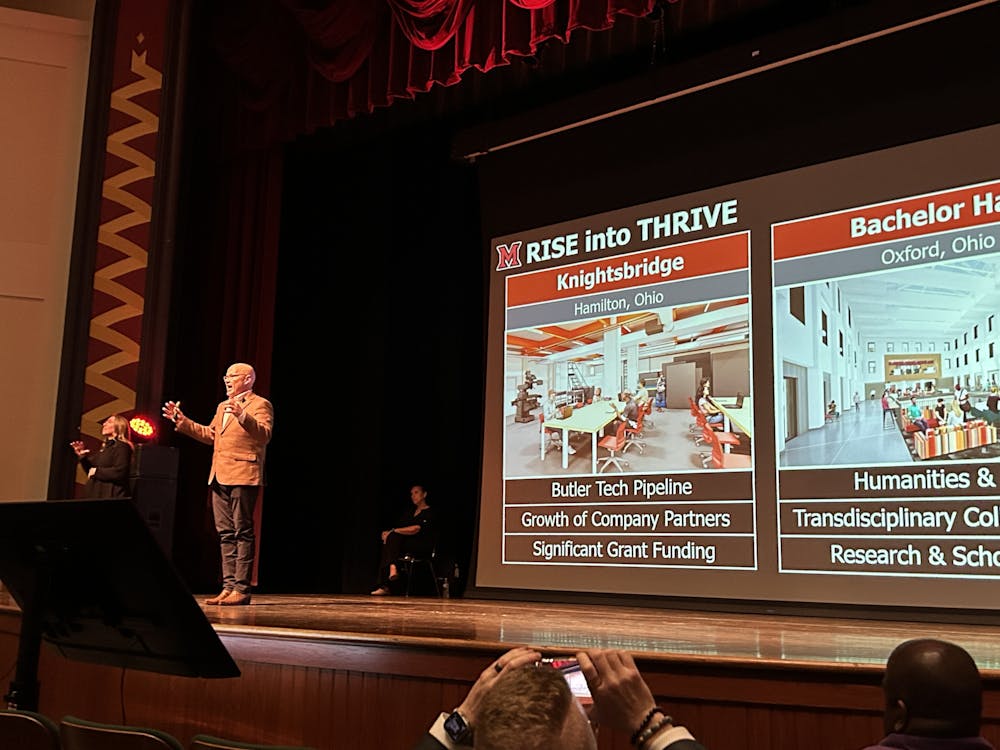President Gregory Crawford made his Spring University Update in Hall Auditorium to hundreds of spectators on April 2. The update included a broad overview of the 2024-2025 school year thus far, as well as an update on MiamiTHRIVE, Miami University’s strategic long-term plan.
The update opened with a performance by Soul2Soul, Miami’s male acapella group. The group sang various renditions of songs by the Eagles, in honor of Crawford's favorite band.
Over the past decade, Miami has been driven by three different strategic plans.
The first, implemented in 2012, focused on student life and experience. In 2019, MiamiRISE followed; it implemented the Honors College and the pathways program, expanded the entrepreneurship program and funded the construction of many new buildings on campus. Miami’s newest strategic plan is called MiamiTHRIVE and focuses on foundational strengths and new opportunities.
Crawford noted that demographics play a large role in the MiamiTHRIVE plan.
“The first is demographics,” Crawford said. “We know we are going to be in about a 10% decline over the next decade for high school students. The second is [that] families are worried about cost and affordability. College got expensive, and it’s important for them to have the right resources.”
MiamiTHRIVE will be accomplished in a series of “waves.” The upcoming wave is broken into three sections: transformative ideas, committed to excellence and operational efficiency. Among these sections include plans for a new co-curriculum certification program, as well as the new “hallmark experience.”
“We wanted to have something that every student at Miami did,” Crawford said, “something they would talk about with their employers or graduate schools or professional schools. This software platform helps students track their experience, kind of like a diary. When they’re done, they may have an outcome that's tangible.”
Crawford then discussed the new plans for Millet Hall, including a new building they will call The Arena District. It will be constructed on Cook Field and will be a multi-use facility.
“There will be games, events, concerts, plays, commencements … We will do everything there,” Crawford said. “It’s a big project.”
The spring update also introduced the new concept of “neighborhood quads.” It’s a new take on living learning communities (LLC). Students with different majors will be mixed into one single quad.
“What we’re trying to get at here is very transdisciplinary,” Crawford said. “Lots of different majors in the mixes, so that people can learn a lot more. We want to have a community bond that's bigger than what we have today.”
Enjoy what you're reading?
Signup for our newsletter
Additional changes that were presented included topics of technological advancements and artificial intelligence (AI). He said the MiamiTHRIVE committee will create a Center for Artificial Intelligence on campus. It would include training, an AI-specific curriculum for undergraduates and research on the development of AI.
Gracie Grady, a senior political science and American studies double major, said she believes that MiamiTHRIVE’s theme of conceptually based goals will benefit students more in the long term.
“Flexibility is needed,” Grady said. “While the physical aspects of MiamiRISE served this university well in the past, I do think that the more conceptual and flexible nature of MiamiTHRIVE has the ability to be impactful to students. Social support is incredibly needed by students right now.”
Josette LaFramboise, a sophomore media and communication major, said she feels as though the creation of a new “neighborhood quad” is counterproductive.
“My freshman year dorm we already had a variety of majors in there,” LaFramboise said. “I think it was beneficial to have different majors in one place. I think it's unnecessary to make a whole quad out of it when you could adjust the way our LLCs already function.”
Cassie Cannon, a first-year political science major, said she thinks that the incorporation of AI into Miami’s curriculum could result in mixed reactions.
“AI will only grow and become more implemented in our lives,” Cannon said. “So students having this opportunity to be educated on artificial intelligence would be very beneficial. The only concern is that if students are given increased access to AI, they may rely on it more and lose some authenticity in their work.”
The update ended with a dedication to outstanding sports leaders, art programs and other department chairs.




